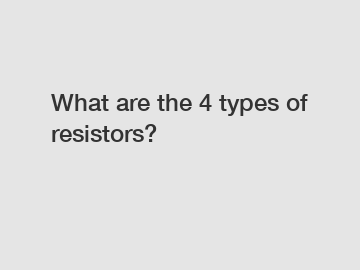What are the 4 types of resistors?
What are the 4 types of resistors?
Resistors are essential components in various electronic circuits that limit the flow of electric current. They are used to control voltage levels, protect sensitive components, and create specific electrical characteristics in a circuit. There are different types of resistors available, each designed for specific applications based on their construction, material, and other properties. In this article, we will explore the four main types of resistors commonly used in electronic circuits.
Carbon Film Resistors.

Carbon film resistors are one of the most widely used types of resistors in electronic circuits. They are made by depositing a thin film of carbon on a ceramic rod and attaching metal caps to the ends. The resistance value is determined by the length, thickness, and type of carbon film used in the resistor. Carbon film resistors are inexpensive, reliable, and have good stability over time. However, they are not suitable for high-frequency applications due to their inductive properties.
Metal Film Resistors.
Metal film resistors are similar to carbon film resistors but use a thin film of metal, typically nickel-chromium or tantalum, instead of carbon. These resistors offer better stability, precision, and temperature coefficient compared to carbon film resistors. Metal film resistors are commonly used in precision applications where accurate resistance values are required. They also have lower noise levels and better temperature stability, making them suitable for high-performance circuits.
Wirewound Resistors.
Wirewound resistors are constructed by winding a wire, typically made of nichrome or other resistive alloys, around a ceramic or fiberglass core. The resistance value is determined by the length, diameter, and material of the wire used in the resistor. Wirewound resistors are known for their high power handling capabilities, low temperature coefficients, and excellent stability. They are commonly used in high-power applications, such as power supplies, motor controls, and amplifiers, where precision and reliability are critical.
Variable Resistors.
Variable resistors, also known as potentiometers or rheostats, are resistors with adjustable resistance values. They consist of a resistive element with a sliding contact that allows the resistance to be changed by moving the contact along the element. Variable resistors are commonly used in applications where the resistance needs to be adjusted manually, such as volume controls, dimmer switches, and tuning circuits. They are available in different types, including rotary potentiometers, slide potentiometers, and trimmer potentiometers, each designed for specific applications.
Conclusion.
In summary, there are four main types of resistors commonly used in electronic circuits: carbon film resistors, metal film resistors, wirewound resistors, and variable resistors. Each type has unique properties and characteristics that make them suitable for different applications based on their requirements for precision, stability, power handling, and adjustability. By understanding the differences between these resistor types, electronics designers and engineers can select the most appropriate resistor for their specific application to ensure optimal performance and reliability.
If you have any questions or need assistance with selecting the right resistors for your electronic projects, feel free to contact us.
For more information, please visit types of fixed resistors, Wirewound Resistors for High-Power Applications, carbon film resistors wholesale.
133
0
0


Comments
All Comments (0)